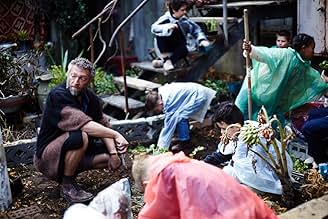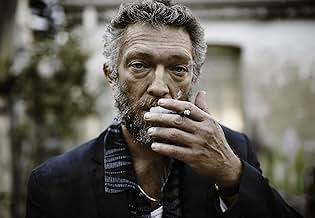AVALIAÇÃO DA IMDb
5,8/10
4,2 mil
SUA AVALIAÇÃO
Adicionar um enredo no seu idiomaAlexander, a boy who has been raised in a sequestered commune, finds that his increasing unwillingness to fall in line puts him on a collision course with Gregori, the society's charismatic ... Ler tudoAlexander, a boy who has been raised in a sequestered commune, finds that his increasing unwillingness to fall in line puts him on a collision course with Gregori, the society's charismatic and domineering leader.Alexander, a boy who has been raised in a sequestered commune, finds that his increasing unwillingness to fall in line puts him on a collision course with Gregori, the society's charismatic and domineering leader.
- Direção
- Roteiristas
- Artistas
- Prêmios
- 2 vitórias e 14 indicações no total
- Direção
- Roteiristas
- Elenco e equipe completos
- Produção, bilheteria e muito mais no IMDbPro
Avaliações em destaque
This film presents a microcosm of a society governed by a strong patriarchy. Ostensibly it's a haven for those who have suffered at the hands of the wider world but, as the movie slowly reveals, the line between the safety of a haven and the exclusion of fascism is hard to draw.
The most common complaint against this film appears to be that it is 'ambiguous'. However, in my opinion, the film is not ambiguous at all, rather it is 'ambivalent', which may have confused some. The film swings between dichotomies - love and aggression, truth and lies, freedom and control etc. Beautifully summed up by a shot in which Gregory carries in one hand bandages and in the other scissors, perhaps also emblematic of the Eagle in the US federal seal (olive branch in one claw, arrows in the other, literally meaning peace and war).
In my view this film presents us with a social philosophy, one which examines how the sins of our past are passed down onto the children of our future. Even with the best intentions the patriarchal harem that 'Gregory' has created, with its goal of protection, relies on his ability to be totally benign which, owing to the vicissitudes of human nature, is impossible. Thus the ideal of fascism becomes a facade behind which repression and hypocrisy reside. The micro-society depicted is a partisan one. However, the true follower of its values himself becomes a partisan and ironically is therefore in transgression of his autocratic ruler.
There are rich visual metaphors throughout which support a fully animated subtext. All elements of this film are superb, including the acting and the directors gradual unravelling of the pervasive ambivalence in relationships is masterful. The message here can be translated both socially and personally and because of that, like many great films before it, it has a multiform impact and can be watched in many ways. It's not quite genius, but it is extremely good.
Personal, relevant and very well made.
The most common complaint against this film appears to be that it is 'ambiguous'. However, in my opinion, the film is not ambiguous at all, rather it is 'ambivalent', which may have confused some. The film swings between dichotomies - love and aggression, truth and lies, freedom and control etc. Beautifully summed up by a shot in which Gregory carries in one hand bandages and in the other scissors, perhaps also emblematic of the Eagle in the US federal seal (olive branch in one claw, arrows in the other, literally meaning peace and war).
In my view this film presents us with a social philosophy, one which examines how the sins of our past are passed down onto the children of our future. Even with the best intentions the patriarchal harem that 'Gregory' has created, with its goal of protection, relies on his ability to be totally benign which, owing to the vicissitudes of human nature, is impossible. Thus the ideal of fascism becomes a facade behind which repression and hypocrisy reside. The micro-society depicted is a partisan one. However, the true follower of its values himself becomes a partisan and ironically is therefore in transgression of his autocratic ruler.
There are rich visual metaphors throughout which support a fully animated subtext. All elements of this film are superb, including the acting and the directors gradual unravelling of the pervasive ambivalence in relationships is masterful. The message here can be translated both socially and personally and because of that, like many great films before it, it has a multiform impact and can be watched in many ways. It's not quite genius, but it is extremely good.
Personal, relevant and very well made.
The movie provides a safety of anonymity over its characters by never giving away the location of the setting, an isolated dream taking place beyond the pale of society with its own mechanism, but sometimes a lucid dream gives life to what is kept in the deep hollows of the collective consciousness.
Alexander, a young boy of sensibility, lives among a community of children and women overseen by just one man, Gregori. The film documents the manipulation that takes place as the group exist to function for a cause of its own and juxtaposes the fanaticism, of a controlled and ultimately an abusive nature, with the open wonder of the innocence of childhood.
The mechanisms of Oedipal crisis is at work and Alexander opens his eyes to the world around him, made significant with the arrival of a baby brother. However, the much debated theme, commonly based on the Freudian concept of repressed sexuality, makes its transition much quicker to the stages of puberty and adulthood as the boy begins to realize his actions must now carry the consequences of social responsibility, or the lack thereof.
The film ends abruptly to prevent something really serious from happening. Instead, it leaves us on a poignant note of a scene, reminding us of Ezekiel 25:17, with boy Alexander emanating a plea for deliverance through his being as he stares down the only responsible man in his eyes.
Dream-like, painstaking and most certainly a unique film experience that's put the young director on my radar.
Alexander, a young boy of sensibility, lives among a community of children and women overseen by just one man, Gregori. The film documents the manipulation that takes place as the group exist to function for a cause of its own and juxtaposes the fanaticism, of a controlled and ultimately an abusive nature, with the open wonder of the innocence of childhood.
The mechanisms of Oedipal crisis is at work and Alexander opens his eyes to the world around him, made significant with the arrival of a baby brother. However, the much debated theme, commonly based on the Freudian concept of repressed sexuality, makes its transition much quicker to the stages of puberty and adulthood as the boy begins to realize his actions must now carry the consequences of social responsibility, or the lack thereof.
The film ends abruptly to prevent something really serious from happening. Instead, it leaves us on a poignant note of a scene, reminding us of Ezekiel 25:17, with boy Alexander emanating a plea for deliverance through his being as he stares down the only responsible man in his eyes.
Dream-like, painstaking and most certainly a unique film experience that's put the young director on my radar.
Review: For such a basic movie about a man, Gregori (Vincent Cassel) who builds his own territory for troubled women with children, and also lives with his wife Susanna (Florence Mezzara) and young son Alexander (Jeremy Chabriel), who is a trained cold blooded killer, it really did touch me. Alexander just wants do be a normal young boy, and he is curious about the outside world and the right and wrongs of life but his father has his own ideas for Alexander, and he tries to gear him towards the secluded life that he has built. After the strange disappearance of a young boy, who turns against Gregori, Alexander becomes weary of his father's intentions and he starts to question his life as an assassin, which doesn't go down to well with Gregori. His love for his mother and there new born baby, makes him take matters into his own hands, so he can better there life and get them away from the demanding and extremely unorthodox, Gregori. This is definitely an original concept, with some great acting from Cassel, Chabriel and the little boy who goes against Gregori. The whole trained assassin element, was a bit weird and the fact that they kept on getting away with it, wasn't very realistic but the rest of the storyline was great. Scenes like when Gregori's methods were questioned by the little boy, who was totally against killing the chicken, made this film a joy to watch and the transformation for Cassel, who really did look like he had the world on his shoulders, was also impressive. For a low budget, independent movie, that didn't get the biggest distribution campaign from the studio, I'm glad that I gave this movie a chance because I thoroughly enjoyed it. Great!
Round-Up: French actor Vincent Cassel, 49, first impressed me in the movie La Haine in 1995, and he has gone on to make big budget movies like Joan of Arc, Shrek, Irreversible, Ocean's 12 & 13, Derailed, Eastern Promises, Mesrine, Black Swan, A Dangerous Method and Child 44. His next big movie, Jason Bourne alongside Matt Damon, proves that he definitely has the ability to star in big budget movies, while he still makes films for his native country but I personally think that he doesn't get the recognition that he deserves. Anyway, this movie was directed and written by Ariel Kleiman, 31, who has only made 5 shorts in his career. For his first major project, he certainly got the most out of the actors and the great script kept the movie interesting, from beginning to end.
I recommend this movie to people who are into their thriller/dramas starring Vincent Cassel, Jeremy Chabriel, Florence Mezzara and Charlotte Miller. 7/10
Round-Up: French actor Vincent Cassel, 49, first impressed me in the movie La Haine in 1995, and he has gone on to make big budget movies like Joan of Arc, Shrek, Irreversible, Ocean's 12 & 13, Derailed, Eastern Promises, Mesrine, Black Swan, A Dangerous Method and Child 44. His next big movie, Jason Bourne alongside Matt Damon, proves that he definitely has the ability to star in big budget movies, while he still makes films for his native country but I personally think that he doesn't get the recognition that he deserves. Anyway, this movie was directed and written by Ariel Kleiman, 31, who has only made 5 shorts in his career. For his first major project, he certainly got the most out of the actors and the great script kept the movie interesting, from beginning to end.
I recommend this movie to people who are into their thriller/dramas starring Vincent Cassel, Jeremy Chabriel, Florence Mezzara and Charlotte Miller. 7/10
For all intents and purposes Partisan neither feels like, looks like or acts like an Australian film despite it very much so being one. It's a rare thing for an Australian film to achieve that feat of not actually feeling Australian and while it's hard to know whether in the case of Ariel film here if this is a good thing, it's not hard for one to feel that Partisan is a sadly frustrating experience to witness.
Filmed in a dark, gloomy and atmospheric fashion by first time feature film director Ariel Kleiman, Partisan looks the part and while it's never stated where or at what time this film takes place it has an almost 1984 feel to proceedings that gives it a universal feel that this is a tale that could be happening anywhere in our great big world. The troubling thing about Partisan is that this non-disclosure of where the film is taking place is just one of many things that it never lets the audience into.
Kleiman's whole film feels eerie, almost an Oliver Twist gone bad type feel as Vincent Cassel's Gregori looks over and trains his not so merry band of children to go about some pretty confronting missions, but Partisan never cares to absolutely let us into its mindset, although it's clear Gregori is some type of saviour to women in need.
You keep watching in hope of finding out more behind the whole thing but sadly the answers are never forthcoming, which is a shame as young actor Jeremy Chabriel handles himself well despite his character of Alexander not being an overly endearing one and Vincent Cassel (a last minute replacement of Oscar Isaac) acquits himself well. Kleiman also shows enough to suggest his future endeavors could be quite the treat and the films soundtrack by Daniel Lopatin (aka Oneohtrix Point Never) is easily one of the year's best.
It's all fine and well to have your film remain shrouded in some mystery but unfortunately for Partisan there's just too much mystery and not enough answers and the film suffers emotionally for it and fails to engage in the way in which it so easily could've. A unique Australian backed effort with moments of genuine greatness, Partisan has wins but far far too many losses to compensate for.
2 upside-down chickens out of 5
Filmed in a dark, gloomy and atmospheric fashion by first time feature film director Ariel Kleiman, Partisan looks the part and while it's never stated where or at what time this film takes place it has an almost 1984 feel to proceedings that gives it a universal feel that this is a tale that could be happening anywhere in our great big world. The troubling thing about Partisan is that this non-disclosure of where the film is taking place is just one of many things that it never lets the audience into.
Kleiman's whole film feels eerie, almost an Oliver Twist gone bad type feel as Vincent Cassel's Gregori looks over and trains his not so merry band of children to go about some pretty confronting missions, but Partisan never cares to absolutely let us into its mindset, although it's clear Gregori is some type of saviour to women in need.
You keep watching in hope of finding out more behind the whole thing but sadly the answers are never forthcoming, which is a shame as young actor Jeremy Chabriel handles himself well despite his character of Alexander not being an overly endearing one and Vincent Cassel (a last minute replacement of Oscar Isaac) acquits himself well. Kleiman also shows enough to suggest his future endeavors could be quite the treat and the films soundtrack by Daniel Lopatin (aka Oneohtrix Point Never) is easily one of the year's best.
It's all fine and well to have your film remain shrouded in some mystery but unfortunately for Partisan there's just too much mystery and not enough answers and the film suffers emotionally for it and fails to engage in the way in which it so easily could've. A unique Australian backed effort with moments of genuine greatness, Partisan has wins but far far too many losses to compensate for.
2 upside-down chickens out of 5
A sequestered commune is the setting for Ariel Kleiman's disturbing story about 11-year-old Alexander (Jeremy Chabriel), whose father, Gregori (Vincent Cassell) teaches him a life to be divorced from mainstream life, except when Alexander efficiently murders for money. The joy of the communers juxtaposed with their terrible assignments points up the film's allegorical comment on the danger of isolationism.
The film points out the ironic Christ-like parallel as Gregori carries wood across his shoulders to begin building a home for his children and harem. The contrast between his love for his life and the horrid tasks for the children is obvious and a telling comment on the dangers of messianic obsession.
A couple of the young boys, including Alexander, rebel against Alexander's tyranny and become objects of deep concern for Gregori. Even an unauthorized candy bar could be trouble. Mostly, though, it's the natural contrariness of youths, exacerbated by the limiting confines of a closed community, that leads Alexander to begin straying.
While Kleiman leaves out the spiritual development of the commune, especially with so many women complying, and definitely leaves the audience hanging at the end, the film is successful showing a productive closed society, a Utopia if you will, the downside appearing as a dark stain not easily expunged.
The film points out the ironic Christ-like parallel as Gregori carries wood across his shoulders to begin building a home for his children and harem. The contrast between his love for his life and the horrid tasks for the children is obvious and a telling comment on the dangers of messianic obsession.
A couple of the young boys, including Alexander, rebel against Alexander's tyranny and become objects of deep concern for Gregori. Even an unauthorized candy bar could be trouble. Mostly, though, it's the natural contrariness of youths, exacerbated by the limiting confines of a closed community, that leads Alexander to begin straying.
While Kleiman leaves out the spiritual development of the commune, especially with so many women complying, and definitely leaves the audience hanging at the end, the film is successful showing a productive closed society, a Utopia if you will, the downside appearing as a dark stain not easily expunged.
Você sabia?
Principais escolhas
Faça login para avaliar e ver a lista de recomendações personalizadas
- How long is Partisan?Fornecido pela Alexa
Detalhes
Bilheteria
- Faturamento bruto mundial
- US$ 72.151
- Tempo de duração1 hora 34 minutos
- Cor
- Proporção
- 2.35 : 1
Contribua para esta página
Sugerir uma alteração ou adicionar conteúdo ausente
























